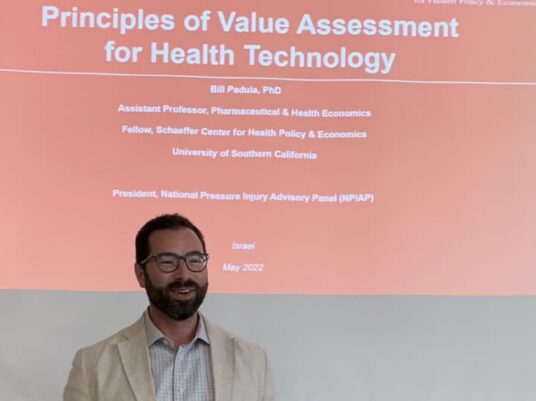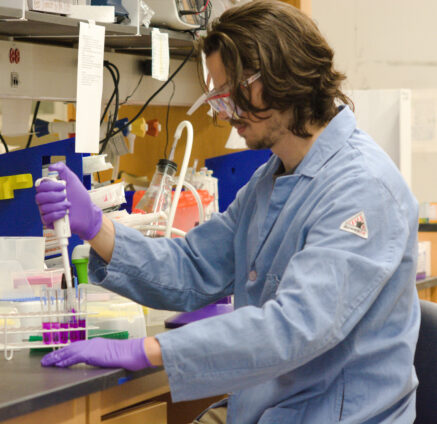Eliciting Patient Preferences to Assess the Value of Breast and Prostate Cancer Therapies
July 8, 2025PhF Frontier Award recipient Dr. William Padula of University of Southern California is conducting research on the value of therapies for metastatic breast and prostate cancer, with a focus on the inclusion of patient perspectives.

The U.S. spends billions of dollars each year on medicines to treat about 320,000 new cases of breast cancer and 314,00 new cases of prostate cancer. As the debate around drug costs continues to make national headlines, health care stakeholders — patients, providers, and payers — often have differing opinions when it comes to the “value” of new medicines.
William Padula, PhD, assistant professor of pharmaceutical and health economics at the University of Southern California, and a team of colleagues received a $500,000 Frontier Award in Value Assessment from the PhRMA Foundation to conduct research on the value of therapies for metastatic breast and prostate cancer, with a focus on the inclusion of patient perspectives.
To help guide the study, Padula has formed a Stakeholder Advisory Board of academic experts, health care providers, and patient advocates — including cancer patients, survivors, family caregivers, and representatives from patient advocacy groups CancerCare and the Breast Cancer Fundraiser. The advisory board weighs in on issues such as the development of patient survey questions, how the research is conducted, and the analysis and interpretation of the study results.
“Part of patient engagement is making them team members,” Padula said. “Not everybody on the stakeholder group has a PhD, but everyone is part of the research team.”
Padula’s research is examining the benefits and costs of breast cancer and prostate cancer therapies using the Generalized Risk-Adjusted Cost-Effectiveness (GRACE) model. Unlike traditional cost effectiveness analyses, the GRACE framework includes novel elements of value and incorporates evidence on patient preferences to quantify how much they would value improvements in their quality of life and life expectancy. GRACE recognizes that health improvements will hold greater value for individuals with severe illnesses or disabilities compared to healthier individuals, leading to higher willingness to pay for health improvements for severe conditions.
This research builds on work by Padula’s co-investigators, Darius Lakdawalla, PhD (recipient of a PhRMA Foundation Value Assessment 2020 Challenge Award) and Karen Mulligan, PhD (recipient of a PhRMA Foundation 2023 Mid-Career Faculty Grant in Value Assessment and Health Outcomes Research).
In the project’s first phase, Padula analyzed real-world claims data from thousands of breast cancer and prostate cancer patients to understand the burden of illness associated with different established treatment alternatives. He found that a significant portion of patients switch between therapies during treatment, in part because many health insurers require patients to try and “fail” on the standard of care before being given newer therapies. He said the real-world evidence suggests that strategies like “fail first” policies may not be the best solution for certain cancer types.
“Think about how much waste there is in putting patients through treatments that are not working or underperforming what the doctor and patient expect,” Padula said. “We are being penny-wise, pound foolish with these access barriers for innovative new treatments. In the end, we are paying double because you are paying for the initial course of treatment and then you’re paying for the switch to a new course of treatment.”
Padula, Lakdawalla, Mulligan, and colleagues are now working on the project’s second phase: surveying patients to gauge their preferences in terms of improving survival, quality of life, life expectancy, and side effects to better understand the value of novel treatments for breast and prostate cancer. The advisory board is helping to adjust an existing survey for collecting GRACE preference measurements to be more cancer-specific, such as by adding questions related to hair loss and daily nausea. “That sort of guidance is exactly what we are hoping for to help chisel this down from being a very broad universal instrument to one that is disease specific,” he said.
In the last phase, Padula and colleagues will incorporate the survey results and real-world evidence data into his GRACE model calculations to establish a range of cost-effectiveness thresholds for cancer therapies, stratified by cancer type and disease severity. By tailoring this method to specific diseases, the study will provide insight into patient preferences on a more granular level, he said. For instance, researchers could also break down the data to look at information such as similarities and differences in how men and women perceive their cancers.
“By having those preferences measured, we can then in the future apply adjustments to traditional cost-effectiveness models and come up with new estimates of value based on novel value elements that the GRACE method defines,” Padula said.
He hopes this work will provide a foundation for researchers to easily adapt and implement GRACE for other cancers and diseases. “The PhRMA Foundation Frontier Award has provided me with the bandwidth to think creatively about GRACE applications and how we can expand GRACE to other areas,” he said. “That represents the promise of this work.”
“This is going to change the trajectory of my career and the impact I could have in health economics and outcomes research,” Padula said.
